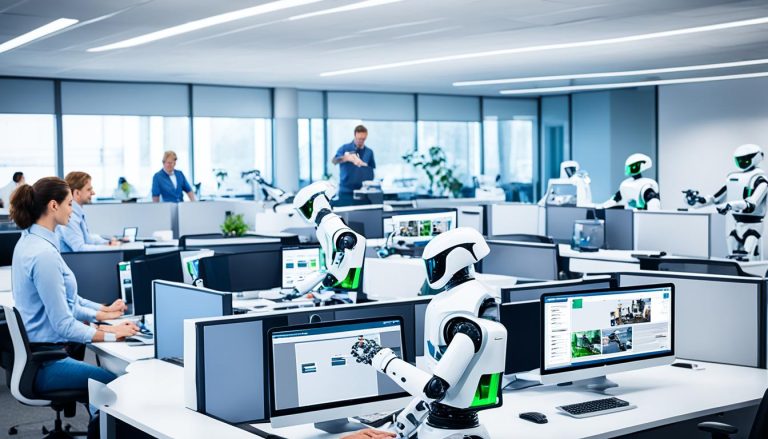How will AI virtual assistants change our work lives? Many people are unsure about AI friends at work. Katie Carroll, Stephen Higgins, and Freddie Berberena of Empyrean believe AI is changing businesses. These tools don’t replace us but make our skills stronger. They help us be more empathetic and knowledgeable at work.
At Evolve24, Empyrean showed how AI can make businesses better. It can make work smoother, help us make better decisions, and update old business ways for today’s world. This marks the start of a new era in work, all thanks to AI friends.
Key Takeaways
- AI companions are designed to enhance human capabilities, not replace them.
- Empyrean emphasizes the importance of empathy and expertise in integrating AI technologies.
- AI in business is proving to streamline operations and improve decision-making.
- AI virtual assistants are pivotal for evolving traditional business models.
- Empyrean’s session at Evolve24 showcases the value of AI in contemporary professional settings.
Introduction to AI Virtual Assistants
AI virtual assistants are transforming how we do business. They offer scalable solutions that change how operations work. Thanks to intelligent automation, these assistants work all day and night. This gives companies a lot of flexibility.
They take over tasks that usually need people, which makes workflows smoother and more efficient.
AI virtual assistants can learn new skills. This is a big deal for digital transformation strategies. It makes many processes in a company better.
They handle repetitive tasks and talk to customers. This makes them very helpful.
- Scalability: AI virtual assistants can easily scale up or down based on the needs of the business, ensuring a seamless experience for users.
- Operational Efficiency: With intelligent automation, businesses can optimize their workflow, making processes faster and more efficient.
- Customer Engagement: These assistants optimize customer interactions, providing timely and accurate responses that enhance customer satisfaction.
Using AI virtual assistants is essential for businesses wanting to keep up with customer needs and market changes. As companies adopt this technology, they get better at making decisions and running operations.
The Role of Natural Language Processing in AI Virtual Assistants
Natural Language Processing (NLP) changes how AI virtual assistants communicate. It makes them understand and speak like humans. This tech is key for advanced conversational AI and voice interfaces.
Overview of Natural Language Processing
Natural Language Processing uses computer techniques to understand human speech and language. It helps virtual assistants get the meaning and context of what people say, not just the keywords.
How NLP Enhances Virtual Assistants
Thanks to NLP, AI virtual assistants are getting smarter and more personal in chats. They handle complex language patterns well. This makes talks feel real. NLP also powers voice interfaces, improving how we talk to different devices.
Future Potential of NLP in AI Assistants
The future of NLP looks bright for AI virtual assistants. They’ll have even better conversation skills, understanding context and emotions more deeply. This will change how we use conversational AI, making our digital world smarter and more understanding.
Benefits of AI Virtual Assistants in Business Workflows
Integrating AI virtual assistants into your company can change the game. They do more than automate tasks. They boost productivity and make things run smoother.
Automation of Repetitive Tasks
AI virtual assistants are stars at intelligent automation. They take over boring tasks so employees can do more creative work. This means people can focus on what humans do best.
Improving Flexibility and Accessibility
AI virtual assistants work all day and night. They make it easy for businesses to answer customer questions anytime. This keeps customers happy and connected.
Also, chatbots can handle lots of chats without dropping the ball. This means better service for more people.
Enhancing Productivity and Efficiency
AI virtual assistants are quick at sorting through data. This helps with productivity enhancements. They offer fast insights, helping businesses make smart moves.
This improves how well things run. And it helps the business grow in a steady, sustainable way.

More and more businesses are using AI virtual assistants. They’re proving to be key in making companies work better. As this continues, their impact on business workflows grows. This shows how important it is to keep up with these smart technologies.
Conversational AI and the Evolution of Voice Assistants
Conversational AI has changed how voice assistants work. It uses advanced voice recognition to make interactions better. Voice assistants can now handle complex talks, making things easier for users.
Voice recognition tech has grown. It lets voice assistants understand and reply to complex speech. This makes them more useful in our daily lives.
For businesses, conversational AI is very helpful. It gives deep insights into what users need. Companies can make their services better and offer personalized experiences. This makes customers happy and builds stronger bonds with them.
| Feature | Early Voice Assistants | Modern Voice Assistants |
|---|---|---|
| Command Handling | Basic Speech Commands | Context-Aware Interactions |
| Understanding Nuance | Limited | Advanced |
| User Insights | Minimal | Comprehensive |
Voice assistants keep getting better thanks to conversational AI. This move towards smarter, more natural interactions is great for everyone. We can look forward to even smoother conversations in the future.
Using Intelligent Assistants to Scale Business Operations
Intelligent assistants are changing how businesses work. They use data analytics to improve decision making. This helps businesses serve their customers better and fill skill gaps.
Data-Driven Decision Making
Intelligent assistants help companies make smart choices. They look at lots of data to offer helpful advice. This makes business operations smooth and helps meet market needs.
Meeting Customer Satisfaction Goals
Keeping customers happy is key. Intelligent assistants help by quickly answering customer questions. They predict what customers need and adjust their help to fit those needs.
Filling Skill Gaps within Organizations
Intelligent assistants also close skill gaps in teams. They carry out tasks with accuracy. This ensures businesses run well and reach their goals without trouble.
Challenges in Integrating AI Virtual Assistants
Integrating AI virtual assistants into businesses comes with benefits and hurdles. These systems need good data and face cyber threats.

Dependence on Data Quality
The quality of data is crucial for AI virtual assistants. They need lots of good data to work well. Bad data can make them less useful in business.
Vulnerability to Cyberattacks
AI virtual assistants can be targets for cyberattacks. As cyber threats grow, these systems could leak business info. Strong cyber security is needed to keep them safe.
Addressing Inhuman Behavior Issues
AI virtual assistants may not always act like humans. This can be a problem in customer service. Better AI and strategies are needed to make them more human-like.
Impact of AI Virtual Assistants on Remote Work Collaboration
AI virtual assistants have made a big impact on remote work, making things more efficient and improving teamwork. These tech marvels change how we handle remote work collaboration. They tackle the usual issues teams face when they are far apart.
Streamlining Communication
AI virtual assistants do a great job at making communication smoother in remote work. They handle schedules, send out reminders, and set up meetings, helping everyone stay in sync. This makes coordinating much simpler and helps keep projects moving smoothly.
Facilitating Virtual Team-Building
Team-building gets a boost from AI, too. AI virtual assistants arrange fun virtual team-building events that bring remote workers closer. They can set up things like online get-togethers or brain-storming sessions, making it easier for teams to connect and collaborate well.
Reducing Zoom Fatigue and Background Noise
A big hurdle in remote work is Zoom fatigue. AI virtual assistants cut down on this by making meeting schedules more efficient and suggesting breaks. They also use tech to cancel out background noise, which helps team members concentrate better and feel less tired from long meetings.
| Benefits | Description |
|---|---|
| Streamlined Communication | Improves scheduling and reminders for smooth workflow. |
| Virtual Team-Building | Facilitates team-bonding activities and collaboration exercises. |
| Reducing Zoom Fatigue | Optimizes meeting schedules and introduces necessary breaks. |
| Background Noise Reduction | Minimizes distractions to maintain focus during meetings. |
Future Trends and Innovations in Digital Assistants
The future of digital assistants is looking up with exciting advancements. They’ll change how we use technology. With predictive intelligence, better IoT integration, and leaps in emotional AI, they’ll be more helpful, connected, and understanding.
Predictive Intelligence
Predictive intelligence is taking digital assistants to new heights. By looking at user data and patterns, they can guess what you need next. This makes them act before you ask, turning them into productivity partners. It means less work for users.
Integration with IoT Devices
IoT integration means things speak to each other more. Digital assistants will run IoT devices at home or work. Everything will work together smoothly. This makes daily tasks easier and managing resources smarter.
Advancements in Emotional Intelligence
Emotional AI is making digital assistants get how we feel. They will interact in deeper ways. This makes support from them feel real and caring, boosting happiness and loyalty among users.
Conclusion
The use of AI virtual assistants is changing the work world. These tech advances help businesses boost human skills, making work settings more flexible and creative. When these tools are put into use, they can make work faster, smarter, and more focused on customers.
AI is not just for doing tasks faster. It also brings people and machines together. This teamwork makes jobs easier for everyone and improves how businesses run. By adding AI helpers, companies are becoming more innovative and can keep up with market changes.
The outlook for AI at work looks bright. As AI gets better, it will play a bigger role in making work easier, helping with decisions, and offering services that are more tailored to what users need. Companies that adopt AI tech can find new ways to be innovative and stay ahead in the digital age.




